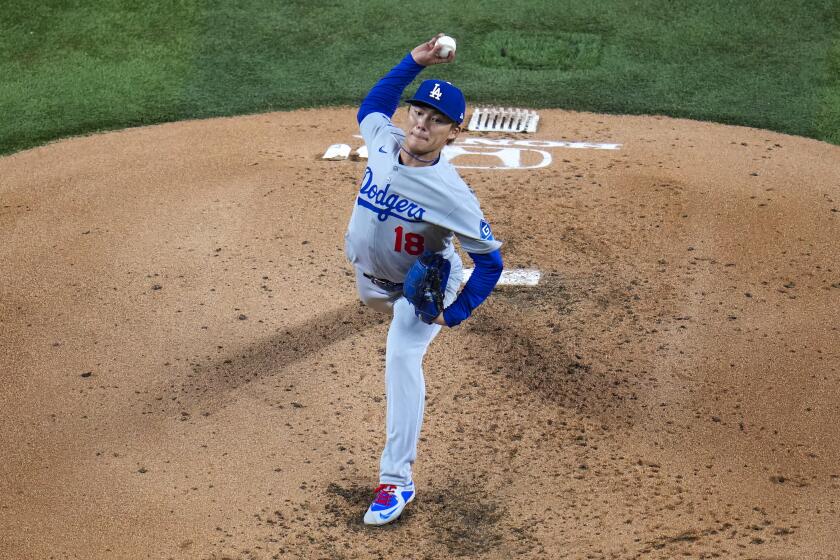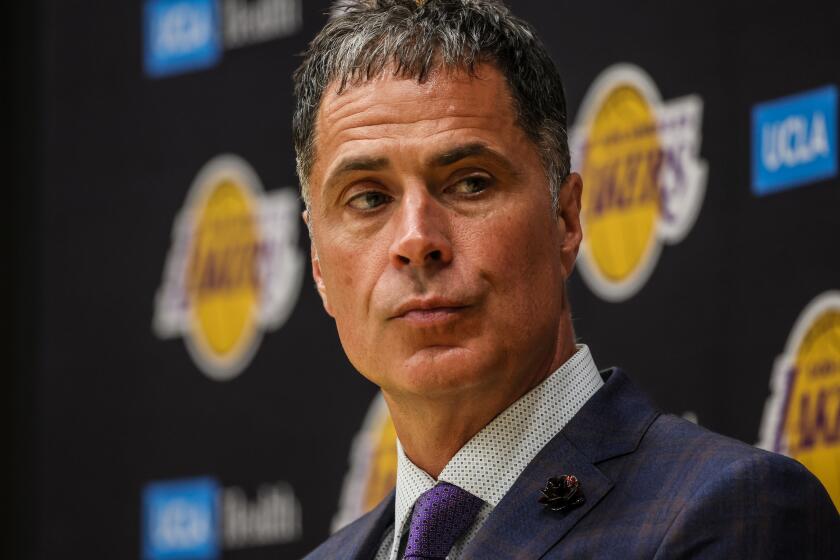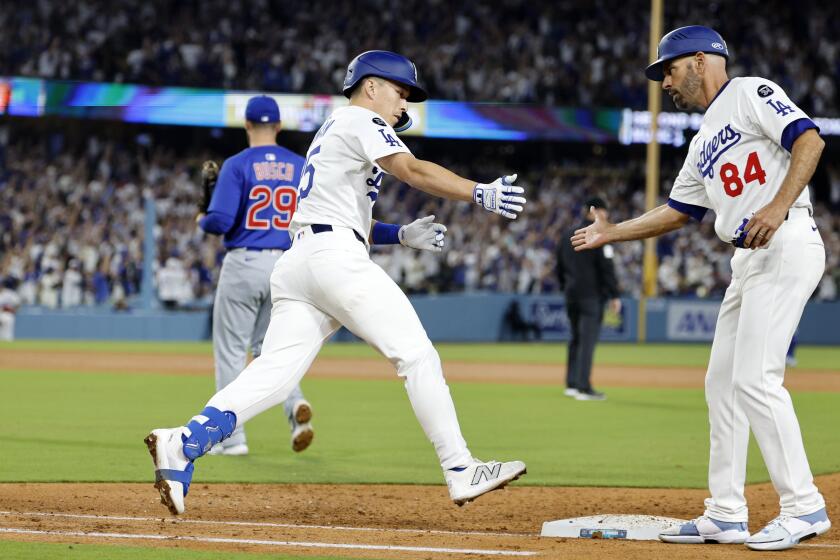View From the Front : Ken Brett Is Getting an Education as the Rookie Manager of Utica Blue Sox
- Share via
UTICA, N.Y. — Ken Brett was the last one on the bus.
That didn’t matter. He saw the front seat opposite the driver’s side was empty and he took it, maneuvering easily inside a narrow space and sitting down by the window.
Protocol is protocol. No matter whether you’re the head man in the White House, the captain of a ship or a manager in the majors or the minors.
On all bus trips in baseball, long or short, the manager sits wherever he wants. He has his choice and always picks the front seat. Everyone knows that’s automatically reserved for him and no one else ever takes it.
“This is the first time I ever sat up here,” said Brett, who was beginning his first season as manager of Utica’s Blue Sox in the Class A New York-Penn League. Actually, it’s his first season as a manager for any team. “You get a much better view from the front seat.”
Brett spent plenty of time in the back of the bus during the three seasons he played in the minors. Most of those buses he rode in weren’t anywhere near as modern or roomy as the one he was getting settled into now--a Canadian built green-and-white 47-seater capable of making coast-to-coast trips almost as fast as a train.
A few minutes after the bus got under way carrying the Blue Sox to Little Falls, N.Y., first base coach Gene Glynn, sitting across the aisle, handed Brett an envelope with his name on it.
Utica’s new manager opened the envelope and removed his meal money, $8.50.
Some explanation goes with that. Players in Class-A ball ordinarily receive $11 a day for overnight trips. They get only $5.50 when they’re coming back home from a trip the same night. Managers and coaches get $8.50 on such trips.
“A little different than the big leagues, isn’t it?” Brett observed to a writer on the bus. “They get $45 a day up there, don’t they?”
Brett’s brother, George, who is four years younger, is the best known member of the family which also numbers two other brothers, John and Bobby. That’s because George came close to batting .400 a few years ago and still is one of the game’s premier hitters with Kansas City.
But 36-year-old Ken made his mark in baseball before George.
When he was 19, he pitched for the Red Sox against the Cardinals in the 1967 World Series, making him the youngest pitcher ever to appear in a World Series up to that time. Later, he also pitched for the Brewers, Phillies, Pirates, Yankees, White Sox, Twins, Dodgers, Royals and Angels.
Ken still does some pitching, but now it’s only batting practice to his Blue Sox players.
The ballpark in Utica was rebuilt from the ground up. The Blue Sox, who began the season June 17, played all their games on the road until the park reopened recently.
On a trip last month, Brett was getting reintroduced to bus travel when a radio tumbled from the overhead rack creating the kind of racket that sounded like a prelude to World War III.
One of the players in the rear jumped straight up in his seat.
“What was that?” he wanted to know.
“My watch,” another player answered him in a typical exchange between a couple of kid ballplayers riding the bus and hoping to make it to the big leagues some day.
Brett stared out the window enjoying some of the rich green rustic scenery along the wayside in the early afternoon.
“Beautiful country up here, isn’t it?” he said to Glynn, who is from Waseca, Minn., and has been in the minors seven years. Glynn is paid by the Expos, one of four big league teams supplying young players to Utica. The Phillies, Rangers and Padres also have some players with Utica.
Unlike most minor league teams, the Blue Sox are a co-operative venture. Two sportswriters, Bob Fowler of the Orlando Sentinel and columnist Greg Larson of the Florida Times-Union in Jacksonville have the biggest investment. But there are 18 other limited partners and they include Miami Dolphins linebacker A.J. Duhe, Atlanta sportswriter Gerry Fraley and Jeffrey Lyons, a movie critic.
Larson had to sell his huge baseball card collection so he could raise $15,000 for his share for the Blue Sox last November. It nearly killed him to give up the cards, but he did it.
Between working at his primary job writing stories for his newspaper and functioning in a dozen different capacities to help the Blue Sox whenever he can find time to make it from Jacksonville to Utica, Larson is in a state of perpetual motion. Fowler, too.
“We were overcome with adventure and bought the team sight unseen,” Larson explains. “Guys on my paper and on Bob’s thought we were crazy. But it’s fun. I can tell you one thing; we sure didn’t do it for the money.”
Brett didn’t do it for that reason, either. With his expenses, all he’s hoping to do is break even.
The last time he was in baseball was three years ago with the Pirates, and the big reason he’s back in it managing now has to do with a TV commercial he made for a beer company last year.
The commercial was pegged to his playing for 10 different teams, because he was traded so often. Brett is pictured trying to figure out what city he’s in. He calls off the names of several of them, then makes a face as if he has just sucked on a lemon and says “Utica?”
Utica Mayor Louis Lapolla saw the commercial and got upset. He felt it was downgrading the city, still remembered for once being a favored meeting place for The Mob or the Mafia.
Lapolla took offense at the commercial and Brett made a special trip to Utica to explain he intended no slight. The whole thing drew considerable publicity and to show their hearts were in the right place, officials of the beer company threw in $50,000 for the team’s new scoreboard. They have also provided a bright neon sign advertising their product and it’s positioned above Brett’s desk in his office where he and everyone else can see it.
“That commercial he made was what gave me the idea to hire him,” says Fowler. “Ken knows baseball, he’s got a great personality and everyone likes him. I think he’s going to make a good manager, especially with our young kids.”
Brett isn’t sure how long he’ll manage after this season.
“I took the job because of motive and opportunity,” he says. “I don’t think I ever would’ve sought it, but I was disenchanted with what I was doing, selling financial printing. My wife, Teresa, knew I wasn’t happy and when the offer to manage came along, she said for me to go ahead and do it because she knew I’d be happier. If I’m happy, she’s happy.”
Being as new as he is to his job, Brett more or less manages by the seat of his pants. On his desk is a copy of The Official Rules of Baseball and The Complete Baseball Handbook by the late Walt Alston.
“There are so many things you have to remember,” Brett says about managing. “You never think about them that much when you’re a player.”
Brett realizes his players have limited experience, so when any of them make a mistake, like his first baseman did the other night in getting thrown out at third base by being overly aggressive, he is exceptionally patient in going over with them what they did wrong.
The thing he dreads is having to tell any of his players they are being released.
“I remember the first time I was released by the Angels in the spring of 1979,” he says. “I was in shock when Jim Fregosi did it to me. Absolutely devastated. I had been in the majors 10 years. I was 30, but I cried.”
Brett finally ended his pitching career in 1982 with Pittsburgh.
“I didn’t quit, I was quit,” he laughs about it now. “I was with the Pirates in spring training and they had traded for another left-hander, Ross Baumgarten. When I went to the park that day, I was going to ask Chuck Tanner where did that leave me, but he caught me first. He said, ‘Kenny, we’re gonna let you go.’ I wasn’t too surprised. I expected it.”
The Blue Sox didn’t start off too well, losing their first six games before they finally beat the Watertown Pirates.
“I felt responsible and it made me a little embarrassed,” confesses Brett, who says he’d consider managing again next year only if it turns out he enjoys the job and feels he’s good at it.
Otherwise, he might wind up becoming a minor league clubowner like Fowler and Larson because his brother, Bobby, has been talking about buying a team in the Class A Northwest League.
“If he does, I’ll probably end up putting money in it, too,” says the first-year Blue Sox pilot, who was considered an even better hitter than his brother, George, as a youngster. “You know the Bretts. They always do things as a family.”
More to Read
Go beyond the scoreboard
Get the latest on L.A.'s teams in the daily Sports Report newsletter.
You may occasionally receive promotional content from the Los Angeles Times.










